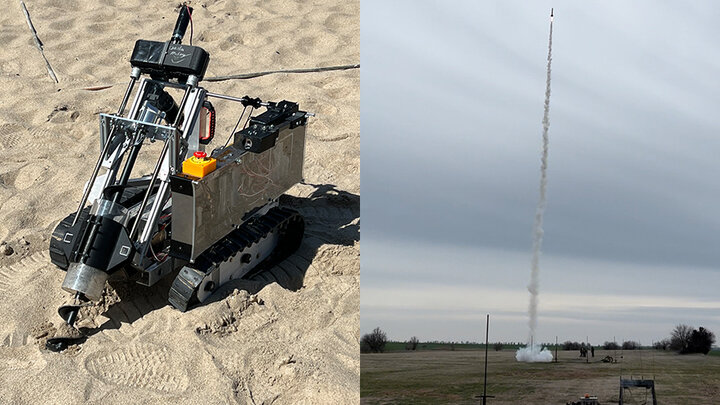he College of Engineering’s Aerospace Club is capping off a successful spring semester with the Lunabotics team participating this week (May 22-25) in the NASA Robotic Mining Challenge, hosted this year by the University of Alabama.
The Nebraska Lunabotics team – led by Angeline Luther, a senior majoring in computer science (Raikes School) and mathematics – built a lunar rover from scratch. This vehicle is designed for specific functions in a setting that simulates the conditions of mining for ice at the lunar south pole. It must be able to traverse lunar regolith simulant and drill for rocks under the ground.
The team tested the rover on the sand volleyball courts north of Abel Hall and submitted a “proof of life” video to NASA to show that the robot was competition ready.
View live streaming and videos from the NASA Robotic Mining Challenge here.
On April 23, the Rocketry team – led by Grant Meyer, a senior majoring in mechanical engineering – successfully launched its largest rocket ever in Concord, Nebraska.
The nearly 10-foot-tall rocket – called EVE, for Enclosed Vegetation Environment - reached 9,760 feet in this launch, one of the last tests before it is entered in the Spaceport America Cup, the world’s largest intercollegiate rocket competition, later this summer in Las Cruces, New Mexico. At that event, EVE will carry corn sprouts as its payload, allowing the team to measure any changes to the corn that occur as a result of the launch.
This year’s success has also been a relaunch of sorts for the Rocketry team, which hasn’t been to a competition in more than four years.
“We’ve worked really hard to rebuild the club’s knowledge base and get the club back to a point where we can be nationally competitive,” said Amber Tannehill, a junior majoring in mechanical engineering. That effort, Tannehill said, includes members attending other college rocket launches to obtain Level 1 certification, at which students build and launch their own 4-foot rockets to learn rocketry basics.
Watch a video from April's Rocketry team launch here.
In late April, the VEXU Robotics team, championed by mechanical engineering undergraduate students Sam Atkins and Karson Swartzbaugh, qualified for and competed at the World Championships April 27-30 in Dallas, Texas.
The Nebraska team won two of its nine rounds and was undefeated in autonomous competition after the first day.
The VEX game challenge changes each year, with disc golf the choice for 2023. Competing robots were tasked with picking up discs scattered across a field and then launch the discs into a goal basket.




